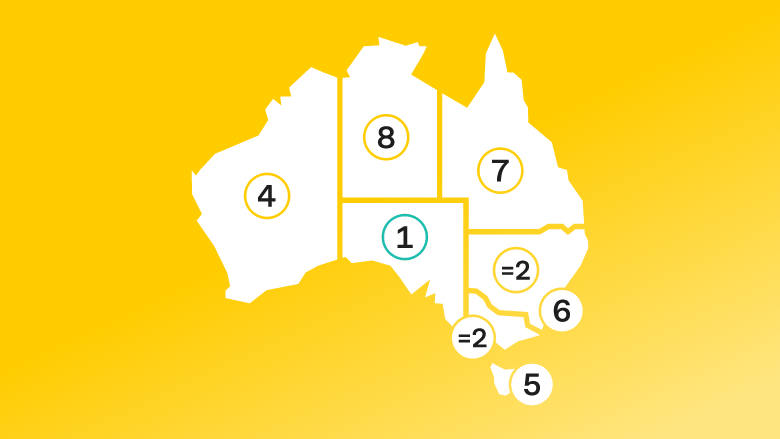Additional state and territory highlights from the report include:
- South Australia ranked first on four indicators, including construction work done and unemployment.
- Western Australia ranked first on relative population growth and equipment investment.
- Victoria ranked third on four of the eight indicators, including retail spending.
- NSW ranked second on three of the eight indicators.
- Queensland ranked first on home loans.
- The ACT ranked first on retail spending.
- Tasmania ranked second on equipment spending and dwelling starts.
- The Northern Territory ranked sixth on relative population growth.
“Overall, economies have slowed in response to higher interest rates, but have generally remained resilient, underpinned by firm population growth and low unemployment,” CommSec Chief Economist Craig James said.
“Justifying South Australia’s position on top of the rankings is the fact that it ranks first on four of the eight indicators. But there are signs the economy is losing momentum as shown by its sixth ranking on the annual rate of change across the indicators.
“Western Australia remains on top of the leaderboard of the annual growth rates of the eight key economic indicators. WA has the necessary momentum to pass South Australia to attain top spot in coming quarters.”
The CommSec State of the States report uses the latest available information to provide an economic snapshot of each state and territory by comparing eight key indicators: economic growth, retail spending, equipment investment, unemployment, construction, population growth, housing finance and dwelling commencements.
Annual growth rates
CommSec also tracks annual changes of the economic indicators. This is useful for measuring economic momentum. Aggregating the results across the eight indicators, CommSec has found:
- Western Australia has the strongest economic momentum, unchanged over the previous two surveys.
- Queensland is in second position ahead of Victoria while the ACT is in fourth spot.
- NSW is in fifth position ahead of South Australia in sixth position, the Northern Territory is seventh and Tasmania is in eighth position.
- Western Australia leads other states and territories on annual growth rates on four of the eight indicators.
- The ACT leads on two indicators. The Northern Territory and Queensland each lead on one indicator.
About the CommSec State of the States Report
The State of the States report uses the most recent economic data available, however while population data relates to the September quarter (population), other data – such as unemployment – is much timelier, covering the month of March with housing finance figures covering February.
CommSec, the digital broking arm of Australia’s largest bank, assesses the performance of each state and territory on a quarterly basis using eight key indicators. Those indicators include: economic growth, retail spending, equipment investment, unemployment, construction work done, population growth, housing finance, and dwelling commencements.
Just as the Reserve Bank uses long-term averages to determine the level of "normal" interest rates, CommSec compares the key indicators to decade averages; that is, against "normal" performance. CommSec also compares annual growth rates for eight key indicators for all states and territories, in addition to Australia as a whole, enabling a comparison of economic momentum.



